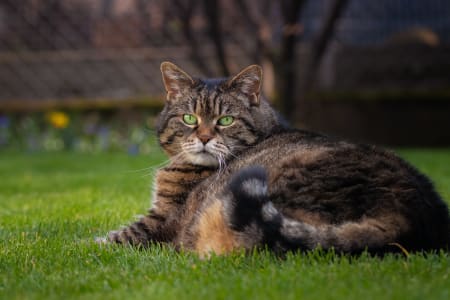How can I tell if my cat is overweight?
The best way to determine if your cat is overweight is to bring them to the vet. The vet can give you a specific diagnosis, and provide advice for weight management.
However, there are a few ways you can tell if your cat is overweight. Try feeling along your cat's rib cage. In healthy cats, the padding will feel about as thick as that on the back of your hand. If you can't feel the ribs at all, or if you can only feel them when pressing firmly, then your kitty may be overweight or obese.
There are also some visual cues that can tell you about your cat's weight and condition. Start by looking down at your cat while they are standing. You should see a slight indentation above the hips that resembles a waist (keeping in mind that this might be difficult to see if your kitty has long hair). If you notice that the waist area bulges out instead, then your cat may be overweight.
How can I help my cat lose weight?
If your vet determines that your cat is overweight, they will prescribe a diet and exercise regimen to help get get their weight back down. Here are a few things you can do to help your cat lose weight.
Regular Exercise
Cats don't need a lot of exercise in order to stay healthy, although the ideal amount varies according to the cat's age and breed. In general, though, aim for two fifteen-minute sessions per day of interactive play, including activities like chasing and leaping after a toy.
You may also consider investing in an indoor cat tree to provide extra opportunities to jump and climb.
Diet & Feeding
You can help your pet lose weight gradually by feeding a nutritious weight control formula cat food. If your cat is very obese, your vet may recommend prescribe a special therapeutic weight loss food. Always transition gradually to get her used to a new kind of cat food.
Check In
Bring your cat to the vet to be weighed on a regular basis. This will let the vet know if further dietary adjustments or testing are needed.
Note: The advice provided in this post is intended for informational purposes and does not constitute medical advice regarding pets. For an accurate diagnosis of your pet's condition, please make an appointment with your vet.
If you think your cat may be over weight, contact Germantown Parkway Animal Hospital in Cordova for an assessment.

Looking for a vet in Cordova and greater Memphis area?
We're always accepting new patients, so contact our veterinary hospital today to book your pet's first appointment.
Related Articles View All
Cats & Colds: Can They Get Them & What To Do?
Many people don't know that our cats can get sick, but they can catch colds just like we can! A cat with a cold will display similar symptoms as humans do such as sneezing and a runny nose. Here, our Cordova vets talk about the causes of cat colds and when to seek veterinary care.
Do cats get depressed?
Cats are known for their independent yet playful characters. So, if your cat seems sad, you're bound to be concerned. Today, we discuss signs of depression in cats, potential causes of cat depression, and what can be done to help your feline friend banish the blues.
My cat sleeps constantly, should I be worried?
No doubt about it, cats love to sleep. But how much is too much? Today, you will discover reasons why cats sleep so much and learn when to be concerned about your cat's sleeping habits.
What To Do If Your Cat or Dog Having Difficulty Breathing
Does your cat or dog's panting mean that they're having breathing difficulties? Today, our Cordova vets look at breathing difficulties in dogs and cats, and how they are treated.
